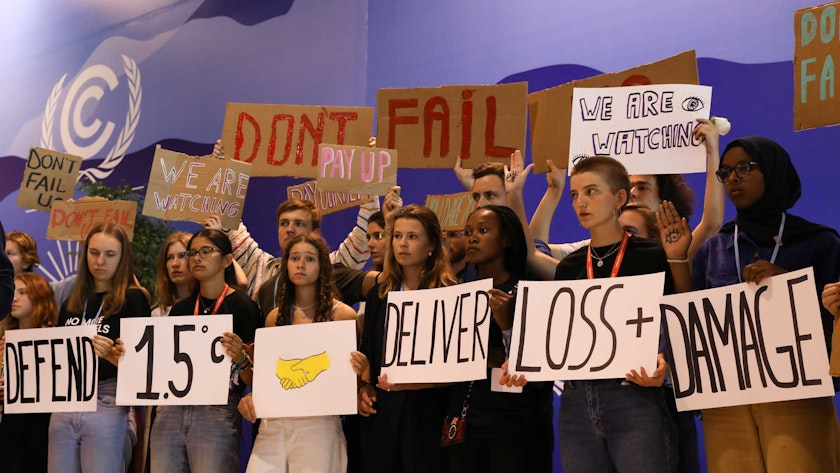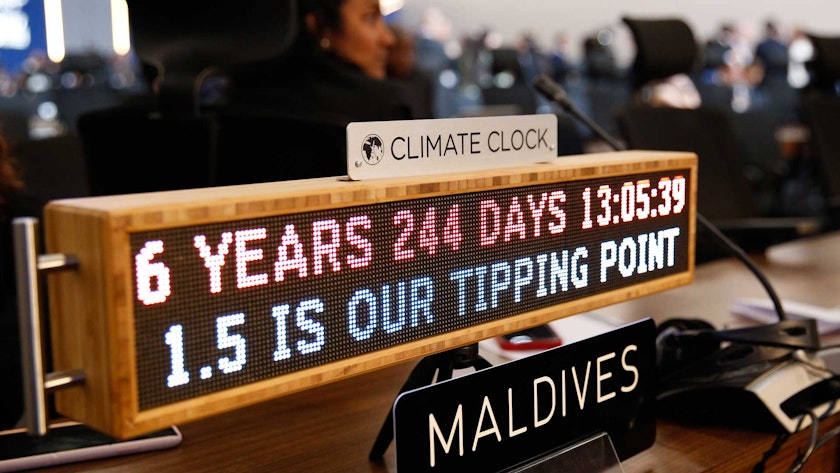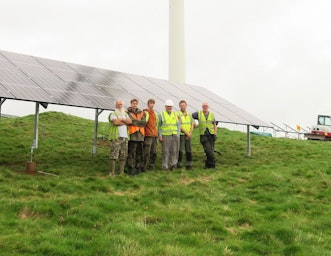
Our foot is still on the accelerator – overview of key outcomes from COP27
November 21, 2022Home » Our foot is still on the accelerator – overview of key outcomes from COP27
COP27 has delivered an important agreement on funding for loss and damage, but fallen woefully short on what’s needed to stop catastrophic climate change. Paul Allen reports.
COP27 opened with a very clear warning from UN Secretary-General António Guterres, who told world leaders that: “We are on a highway to climate hell with our foot still on the accelerator.”
He said the world faced a stark choice over the fortnight of talks: either countries work together to make a “historic pact” that would reduce greenhouse gas emissions and set the world on a low-carbon path – or failure, which would bring climate breakdown and catastrophe.
As the two weeks of talks drew to a close, exhausted negotiators finally agreed a climate deal that paves the way to a fund to support the most climate vulnerable countries to rebuild after climate impacts, but falls woefully short on reducing the emissions that cause the problem in the first place.
Historic win on loss and damage
The final agreement included commitment to set in train a process to support poorer countries on the front lines of the climate emergency to address ‘loss and damage’.
This is a historic achievement after a decades-long fight by the most climate vulnerable countries, who have long argued that they are bearing the brunt of climate impacts despite having contributed very little to global greenhouse gas emissions compared to developed countries.
However, there was no action plan for immediate delivery, and no agreement yet on how the finance should be provided and who should contribute – details that will be worked out in the coming months. The UN has suggested that loss and damage funds should come from the massive profits made by global fossil fuel companies.

Lack of progress on 1.5°C
If immediate actions are not taken to keep average global temperatures rise within 1.5°C, millions more people will be exposed to devastating impacts, and the need for loss and damage funding will drastically increase. We’ve known since the publication of the Stern Review in 2006 that the benefits of early action on climate change mitigation far outweigh the economic costs of not acting.
It’s on progress on reducing global greenhouse gas emissions that COP27 really failed to deliver.
The 1.5°C target remains in the final COP27 text, but there was woefully little progress on the ‘how’. Many now fear that this goal is slipping away, with devastating consequences.
Released during COP27, a new report from the Global Carbon Project found that if emissions remain at current levels the world faces a 50% risk of breaching 1.5°C in nine years. Further analysis of the numbers by scientists from the University of Leeds and Imperial College London suggests that things may be even tighter, with a timescale of just 6.5 years at current rates.
At the end of the Glasgow climate talks, countries agreed to revisit and strengthen their emissions reductions plans, known as Nationally Determined Contributions (NDCs), during 2022, but as COP27 came to a close only 29 new or updated plans had been submitted from a total of 194.
A UN report released just before COP27 looked at the combined NDCs, including those updated this year, and found that current plans and pledges from the world’s governments have us on track for 2.5°C of warming by the end of the century – and will increase emissions by more than 10% by 2030 compared to 2010 levels.
When the Paris Agreement was signed in 2015, humanity was on track for around 3.6°C of warming, so some progress has been made, but at nowhere near that rate demanded by the climate emergency.

Fossil fuels and renewables
Last year in Glasgow, countries committed to “phase down” the use of “unabated” coal. Whilst this was not as strong as the “phase out” that many countries wanted, it was – astonishingly – the first time a resolution on fossil fuels was included in the final text of a COP agreement.
At COP27, some countries argued for a commitment to phase down all fossil fuels, including oil and gas, but this failed and in the end the resolution was the same as that agreed in Glasgow.
Countries did commit to “enhancing a clean energy mix, including low-emission and renewable energy,” but the inclusion of the phrase “low-emission energy” has caused real concern, as it is open to interpretation and could leave the door open for further gas production, for example.
“Still in the emergency room”
The current rise of 1.1°C has already caused major climate disasters. Research from World Weather Attribution, for example, reveals that the devastating floods in Nigeria were 80 times more likely because of the climate crisis.
Yet, after another year of global climate talks, commitments from world leaders still have us on a path to temperature rises of well over 2°C, with the risk of climate tipping points pushing us into even more dangerous territory.
As COP27 came to a close, UN Secretary General António Guterres said:
“Our planet is still in the emergency room. We need to drastically reduce emissions now and this is an issue this COP did not address… A fund for loss and damage is essential – but it’s not an answer if the climate crisis washes a small island state off the map – or turns an entire African country to desert. The world still needs a giant leap on climate ambition. The red line we must not cross is the line that takes our planet over the 1.5C temperature limit.”
In other words, we are still very much on the ‘highway to hell, with our foot on the accelerator.’
Action at all levels
It is clear that the time is long past for incremental changes, we need nothing short of transformational change across every sector.
Whilst global agreements and government action are essential – and governments must now urgently look at their NDCs and work towards a viable pathway for 1.5°C – outcomes from COP27 serve as an urgent reminder that we can’t rely on global negotiations to deliver change at the necessary pace.
Fortunately, new leadership is emerging at local level. By getting the skills and knowledge we need, communities, councils, organisations and individuals are getting on with creating change. By sharing this work with others, and highlighting the many co-benefits of action on the climate emergency, we are demonstrating what can be achieved on the ground to take our foot off the accelerator and explore new ways ahead.
About the author
Paul is CAT’s Zero Carbon Britain Knowledge and Outreach Coordinator. He has been involved with our research into zero carbon scenarios since the beginning, coordinating the development of research reports and liaising directly with government, industry, NGOs and the arts to share findings.
- Zero Carbon Britain
- Climate Change
- News Feed
Related Topics
Related Pages
Related news


CAT Conversations: Sandy Stevens, CAT graduate
17th April 2025
More solar energy for CAT
4th April 2025
CAT Student Bursaries Announced for 2025
30th January 2025EMAIL SIGN UP
Keep up to date with all the latest activities, events and online resources by signing up to our emails and following us on social media. And if you'd like to get involved and support our work, we'd love to welcome you as a CAT member.
